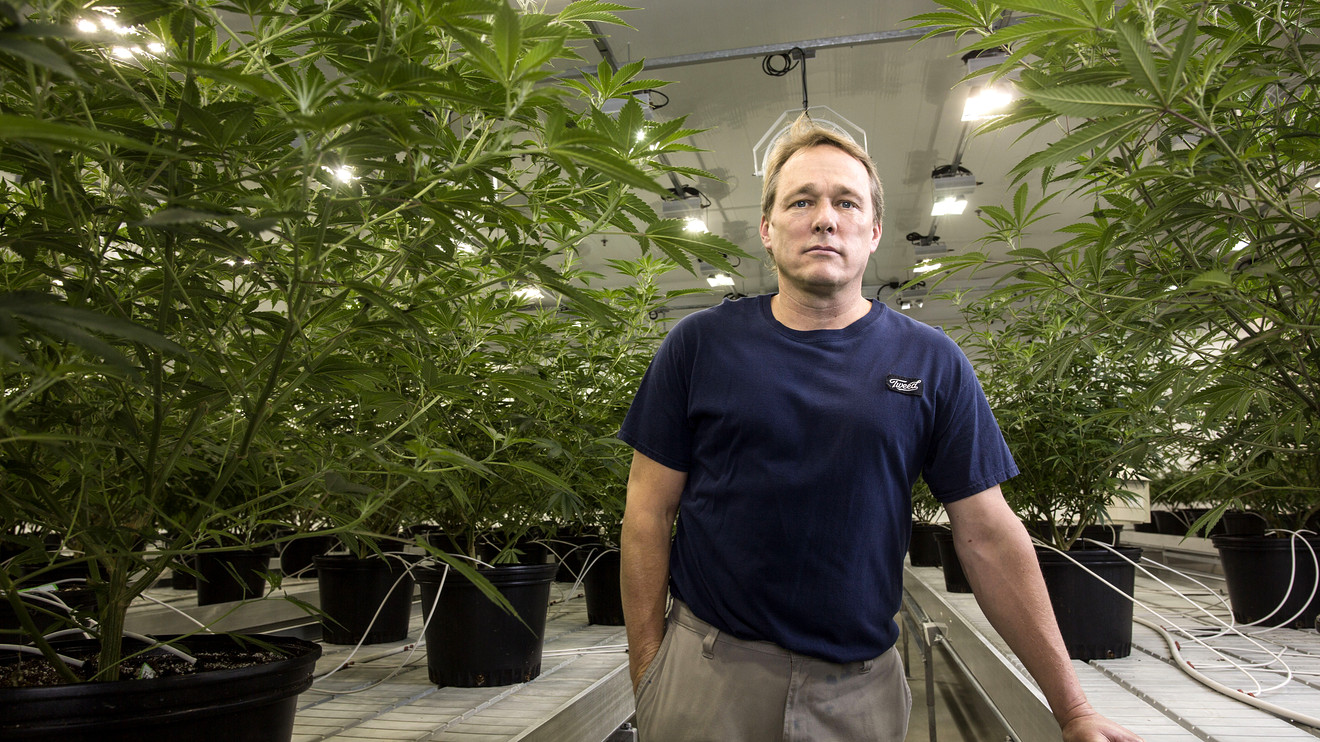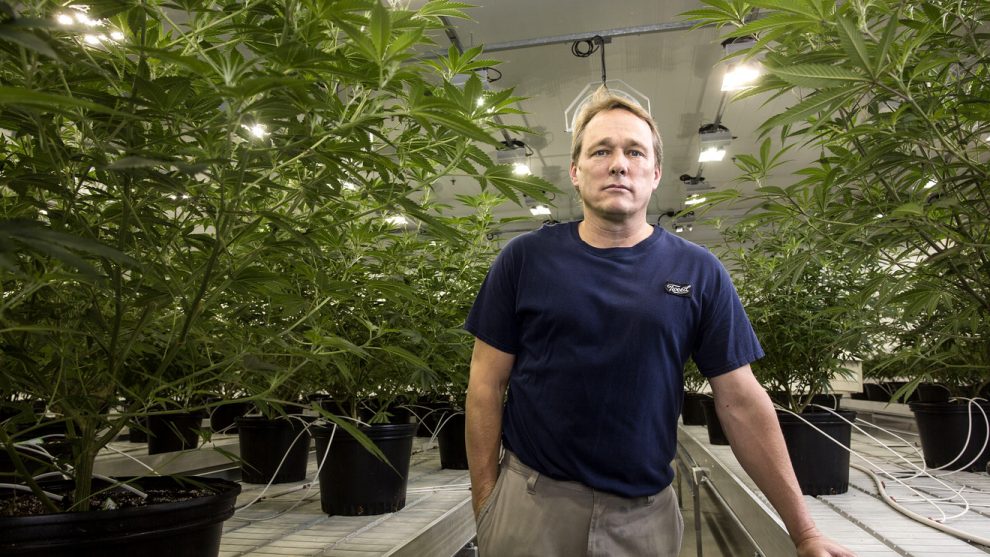
The landmark deal between marijuana companies Acreage Holdings Inc. and Canopy Growth Corp. has its roots amid bunk beds inside a small, cramped house in Klosters, Switzerland.
It was there, a short drive away from the World Economic Forum in Davos in January, that Canopy Growth CGC, -3.17% WEED, -2.91% co-Chief Executive Bruce Linton and Acreage ACRGF, -3.06% CEO Kevin Murphy laid the groundwork for one of the largest acquisitions in the short history of the emerging weed sector, trading jabs at presentations inside of a pub.
“We had a bunch of founders and CEOs of marijuana companies [in the house],” Linton told MarketWatch on the phone Thursday. “A guy running for president in Uruguay was in the bunk bed in the room beside me. We actually had really busy hustle-time all day and events for Davos, and then you would come back together and maybe have dinner and see each other at breakfast or something.”
Linton is now pushing to convince Canopy Growth shareholders to approve the potentially groundbreaking marriage between a Canadian cannabis company and a U.S. multistate operator, amid a fight from some Acreage investors. Canopy and Acreage shareholders are expected to hold concurrent votes on the deal June 19, with both sides needing a majority vote to move forward.
More: Canopy’s proposed U.S. deal is a boon for the U.S. cannabis sector, says this investor
Before meeting in Switzerland, Linton said that while he knew of Murphy and Acreage, the first time they talked was at a presentation inside the bar that was set up as the cannabis-industry space at the summit. The two men sparred on stage over the course of a couple of days.
“It was like the marijuana ghetto,” Linton said, adding that former Israeli prime ministers and a woman who claimed she was a queen in Africa were in attendance. “It was an eclectic group of people.”
After the summit, Linton recalls being impressed with Murphy and Acreage: The goals for the business were realistic, Murphy is pragmatic, had built a strong team and the board of directors has a number of well-known members, including former House Speaker John Boehner and former prime minister of Canada Brian Mulroney, he summarized.
“It’s a lot of overhead, but it also means they’re going to be strict on governance, because they have reputations they can’t risk — and we need that,” Linton said.
Cannabis Watch: Keep up with news from the cannabis industry
Nonetheless, Canopy Growth gave Acreage a hard look before buying the company, sending its head of construction, head of lab work, head of retail, Linton and co-CEO Mark Zekulin to the U.S. for three days to inspect 12 sites. Executives also shopped around. Linton said they held talks with a large number of U.S. operators at Canopy Growth’s headquarters in Smiths Falls, Ontario, and ultimately whittled the list down to Acreage and two other contenders.
According to people familiar with the talks, Harvest Health & Recreation Inc. HRVSF, -2.55% was one of the three companies that Canopy Growth considered buying. Linton declined to identify the two candidates beyond Acreage, but did not deny that Harvest Health was one of them. Harvest did not immediately respond to a request for comment.
“We had three conversations going for quite some time,” Linton said. “There are two or three very good ones out there that people would do well to work with.”
To dream up the idea of acquiring the right to buy a U.S. multistate operator, Linton recalled a theme he has discussed with MarketWatch before — going in the wrong direction in order to figure out the correct path.
“The wrong idea I had was that we would raise a pool of capital that would be run at arm’s length, that we wouldn’t own but would have the right to buy in the future,” Linton said. “What we’d really do is run around America saying, ‘Can we give you money?’”
Read also: An entire industry is being built around CBD, but we really don’t know that much about it
The deal Canopy Growth ultimately settled on was to acquire the right to buy Acreage if the U.S. ends marijuana prohibition, to stay on the good side of regulators on both sides of the border and keep Constellation Brands Inc. STZ, +0.60% — which invested $4 billion in the Canadian producer — happy. However, Canopy would still be involved in the operations of the U.S. company ahead of actually owning the entity, within certain confines, unlike Linton’s first idea with the pool of capital.
“I concluded that what I really wanted to do was use our shares and our intellectual property so we could give them an advantage. And, I wanted to use the creditability of our company to decrease the cost of capital — in a way that wouldn’t piss off the New York Stock Exchange, the banks, and didn’t cause Constellation to have to sell, or the Toronto Stock Exchange.”
Linton said that once he established those criteria, it became clear that it would be possible to give cash to shareholders of a multistate operator and transfer intellectual property as well. Because Canopy Growth cannot make any money on its expertise and technology in the U.S. due to the federal prohibition on marijuana, it is possible to charge Acreage nothing for it and remain in compliance.
Exclusive: Facebook will not allow pot sales on its platform
The deal itself values Acreage at about $3.4 billion and involves giving its shareholders $300 million in cash, or about $2.55 a share, if it’s approved by both companies. Then, Canopy Growth would retain the right to buy Acreage with its paper should the U.S. legalize marijuana federally, or enact something like the STATES Act. Early Thursday, Canopy Growth released roughly 200 pages of documents outlining for shareholders the case for why they should vote in favor of the future acquisition, and has embarked on a publicity tour to sell the deal to its investors.
Unlike the majority of the S&P 500 index SPX, -1.19% , pot stocks — Canopy Growth included — are heavily owned by retail investors. In Canopy Growth’s case, 38% of the stock is held by insiders, institutional investors control 11.4% and about 50% is owned by entities that do not have to disclose holdings, which often means retail investors, according to FactSet. To push the deal forward, Canopy Growth will have to convince retail investors the Acreage deal is a good idea.
At the moment, investors appear conflicted about whether the Acreage deal is a smart play. Marcato Capital Management LP, which owns roughly 3% of Acreage’s subordinate voting stock, rebuked the deal almost immediately after it was made public. But Thursday, Matt Hawkins, managing partner of Acreage investor Cresco Capital Partners LLC, released a letter praising the deal as a much-needed infusion of capital for a sector that is practically desperate for cash.
Canopy Growth stock closed down 3.2% on Thursday, and Acreage fell 3.1% as the marijuana sector declined overall. The ETFMG Alternative Harvest ETF MJ, -3.05% fell 3.1% and the Horizons Marijuana Life Sciences Index ETF dropped HMMJ, -2.84% 2.8%.












